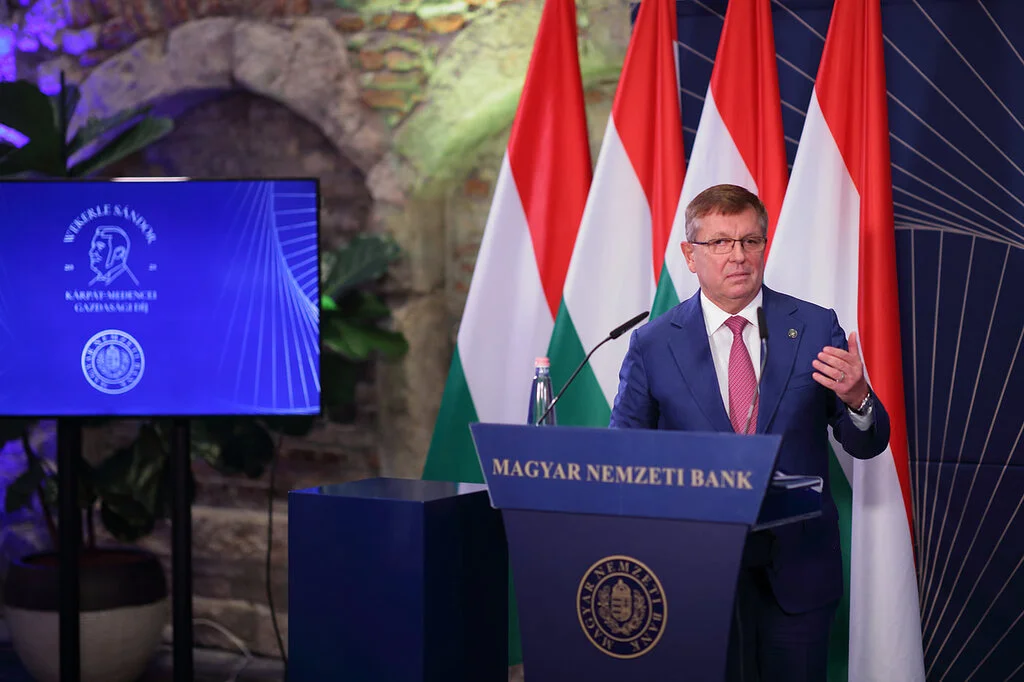Tension between the Hungarian government and the National Bank has flared up again
The tension between the government and the National Bank of Hungary (Magyar Nemzeti Bank, MNB) has flared up again, this time about the Hungarian competitiveness strategy.
As Portfolio reports, the Minister of Economic Development, Márton Nagy, attacked the Hungarian National Bank, citing the fact that, according to his claim, the management of the MNB did not send any professional feedback on the competitiveness strategy drawn up by the ministry, which the government had already accepted in the meantime, but issued a statement criticising it instead.
Disagreement between government and central bank goes back a long way

Márton Nagy in February 2024. Source: MTI/Lakatos Péter
The news that the ice has broken between György Matolcsy, president of the Hungarian National Bank, and Minister of Economic Development, Márton Nagy, came in April, as the two met for a professional consultation, which suggested an improvement in their relationship.
According to Index, in mid-April, the Ministry of National Economy presented the government’s new competitiveness strategy to György Matolcsy. Since then, neither Matolcsy nor the experts of the MNB have sought out the Minister of National Economy or the staff to formally or informally agree on the strategy.
The public could see that the cooperation between the two institutions was going smoothly, thus, the criticism of the central bank, which was published on 13 May, directed publicly against the Ministry of National Economy and therefore the government, came out of the blue.
The two leaders haven’t had a good relationship in the past, with the fact that their conflict was partly professional and partly personal. A good example of the latter is that at the end of February, György Matolcsy described Márton Nagy as someone who has launched attacks against the Hungarian National Bank. To this, the Minister of Economic Development simply said, “Thank God, Matolcsy is no longer my boss.”

György Matolcsy. Photo: facebook.com/jegybank
As Index reported, in April’s meeting, the leaders agreed that in addition to the professional cooperation between the two institutions, they would also hold further discussions on strategic issues in the future. As Nagy stated, people had a right to believe that the relationship between the bank and the Ministry of National Economy had been consolidated and that experts were discussing their professional differences in the background, supported by arguments.
“This behaviour basically means that the Hungarian National Bank is unable to cooperate with anybody so they are making announcements in the media. I served at the central bank for seven years alongside the president and for a total of eighteen years. We think that the prevailing tone used these days is unworthy of the institution. The bank’s management must be responsible for this,” he added.
The minister did not comment on the criticism made in detail, but at the same time, based on discussions with the ministry’s staff, it can be stated that the tone was the strangest part of the criticism, as the Bank’s analysts admitted that 80 percent of the proposals matched the proposals made by the bank’s experts previously.
Thoughts on the new strategy
Index lists some of the most important feedback made by experts on the new strategy. One includes that the government’s competitiveness strategy might not be as radical as it seems, as its aim is not to change the economic policy, only to make some improvements to it.
MNB states that the decisive factor in reaching the goals is not the quantity of investments, but rather its quality structure. Due to the low proportion of smart investments, the structure of investments is not in line with the competitiveness goals appearing in the strategy. A large-scale increase in exports in the production structure of the Hungarian economy entails a similar increase in imports. Instead of increasing the volume of exports, it is worth prioritising the increase of Hungarian added value, they suggest.
Read also:
- Photos: New, special Forint coins issued in Hungary! – Read here
- Possible 400 EUR/HUF exchange rate amid Hungarian Central Bank decisions
please make a donation here
Hot news
New York Times: Orbán uses Hungarian football as a political weapon
FM Szijjártó: All Hungary’s criteria for starting EU accession talks with Ukraine included in framework document
What happened today in Hungary? — 15 June, 2024
Dávid Vitézy calls recount of invalid votes thorough, justified
Luxury castles in Hungary: extravagant buildings for the richest of the country
Historic meeting: EPP President Manfred Weber and Péter Magyar discuss Tisza party’s joining EPP




2 Comments
Candour – is spoken, in greater part, of what we know – history, there record over 14 years in Government, the Orban – Fidesz led Government of Hungary, speak to the citizens of Hungary.
This has not been HELPED by the incompetent – Minister of Finance – Mihaly Varga, a “lover” and major user of PROPAGANDA – who has been along with his Prime Minister & “mate” – a major contributor to the cataclysmic MESS that is FACTUALLY – the Hungarian Economic & Financial position.
How about the central bank, and the fiat currency while at it, both get abolished!
Let’s return to the gold standard and dispense with the jiggery-pokery that is the financialized economy de nos jours.